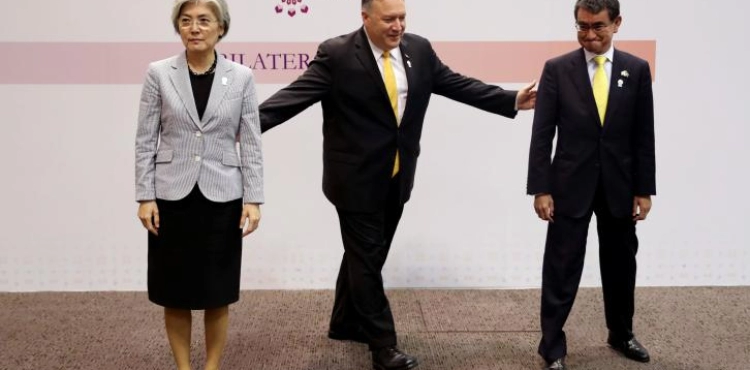Japan and South Korea exchanged trade sanctions on Friday amid growing tension between the two countries over historic differences.
Japan has decided to tighten trade restrictions on South Korea by removing it from a list of countries that benefit from privileged treatment, a measure Seoul saw as punishment, and responded by threatening not to renew the military intelligence exchange agreement.
Japan´s Commerce and Industry Minister Hiroshige Seiko said the measure would come into effect on August 28.
By withdrawing South Korea from the A-class (excluded from licensing procedures for the purchase of sensitive Japanese-made products) to the B-class (mandatory special license), Tokyo means its neighbor is not trustworthy, and before exporting it must be ensured that it will not use the following equipment. From Japan for misplaced ends (especially military).
"It is only a review of the list of trusted countries, a necessary measure in the context of the management of the appropriateness of export control and national security," Seiko said.
But tensions are high between Tokyo and Seoul, which are facing deep historical differences related to the Japanese colonization of the Korean Peninsula (1910-1945), and this dispute is constantly poisoning their relations.
The Japanese government is furious that South Korean courts are demanding Japanese companies to compensate South Koreans who were forced to work in their factories during the Japanese occupation until the end of World War II.
In Seoul, the South Korean government was quick to pull Japan out of its "white list" of outstanding trading partners. South Korea´s Finance Minister Hong Nam-ki said Tokyo´s actions "fundamentally undermine the relationship of trust and cooperation the two countries have established."
South Korean President Moon Jae-in has criticized "this selfish behavior which will seriously damage the world economy by disrupting the international supply chain."
In a televised statement, Moon called on Japan to "withdraw its unilateral and unfair measures as soon as possible and to engage in dialogue."
Japan has been keen to minimize the impact of its decision.
"This is not an export ban. This will not affect the supply network and will not have a negative impact on Japanese enterprises," Seiko said.
Tokyo asserts that many Japanese companies have a permit to export to Class B countries, which would be valid for South Korea.
"If companies have special permits, they should not face barriers," Hajim Yoshimoto, an official at Nomura Securities, told AFP.
But this new measure will not, from Seoul´s point of view, have no detrimental effect as the Japanese want to say.
The list includes 15 categories, each containing dozens of products, ranging from weapons to various electronic devices, chemicals, advanced equipment and equipment for ships.
The escalation coincides with a meeting between Japanese Foreign Minister Taro Kono and South Korean Foreign Minister Kang Kyung-wah in Bangkok in the presence of their US counterpart Mike Pompeo, who said he wanted to help find a way out of the crisis.
The three appeared in front of the cameras in an icy atmosphere, without any word or handshake.
But the meeting "went well," a senior US official said, saying the mere convening showed a desire to "find a solution."
"If this relationship deteriorates, US interests will also be at stake," he warned, given that the two countries are Washington´s key allies in Asia.
"The impact could extend to the automotive sector and many other materials," said Moon Byong-ki, a researcher at the Korea International Trade Association in Seoul.
In early July, Japan decided to lift the exemption from the procedures for three chemicals, among other things, for the manufacture of smartphones and televisions, a decision that has a major impact on South Korean electronics companies such as Samsung and LG Electronics.
Kyung-wha warned that the "framework for South Korea-Japan security cooperation could be affected" by Tokyo´s actions.
In particular, she noted that the renewal of the military information-sharing agreement could be at risk.












